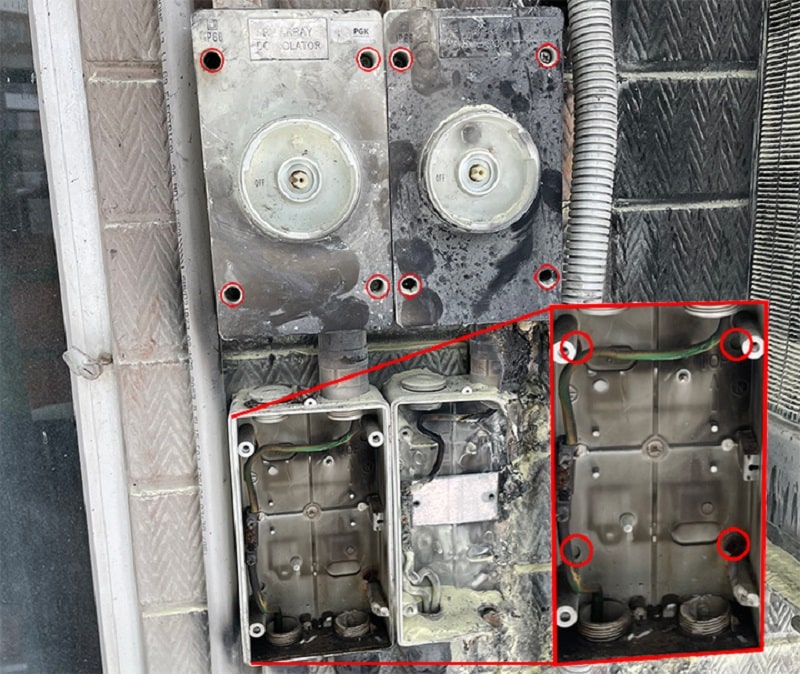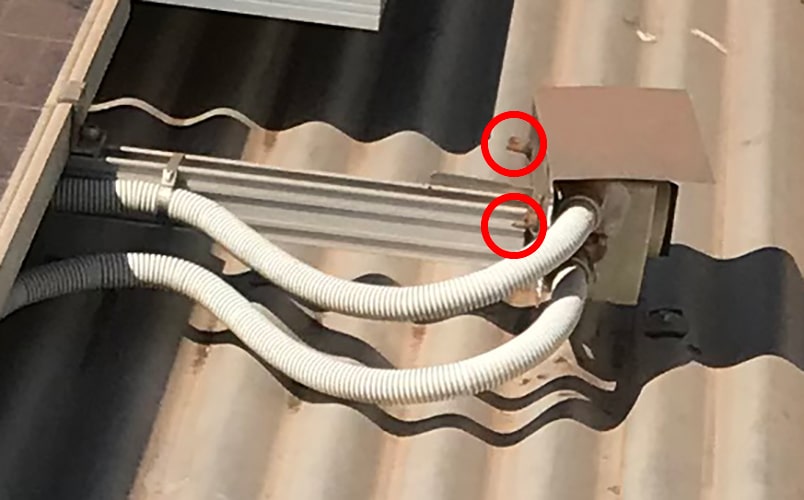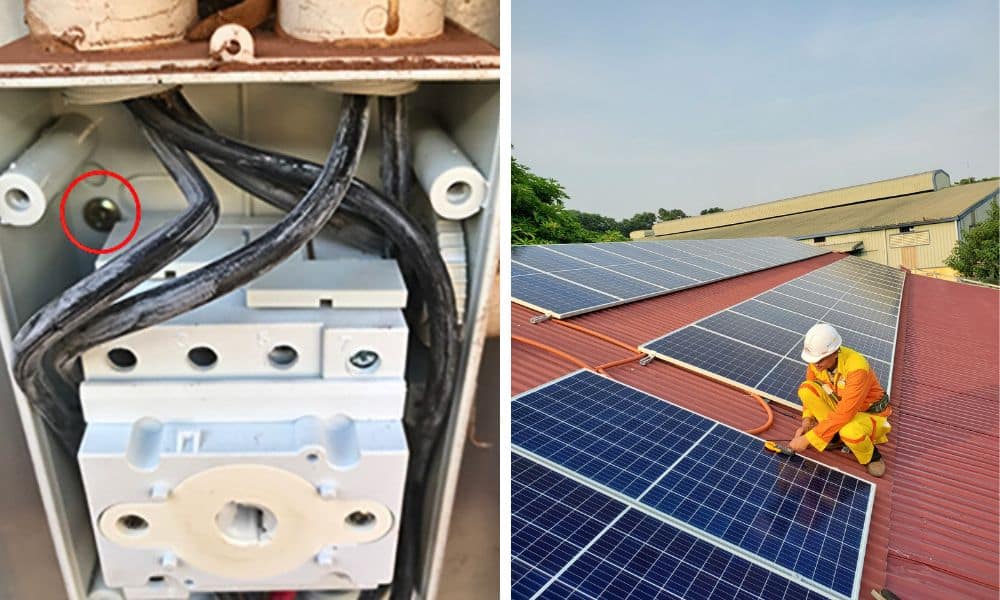Solar panels have become an increasingly common sight on rooftops and in open spaces as the world continues to embrace renewable energy sources. While solar power offers numerous environmental and economic benefits, addressing potential safety concerns associated with these systems is important especially in the Northern Territory (NT), Australia. One such concern is the increased incidence of solar panel NT fires, which has prompted warnings and safety measures by authorities and organisations. In this article, we will delve into the details of the alert provided by NT WorkSafe, emphasising the importance of proper DC isolator installation, the potential risks of incorrect installation, and steps to ensure safety in electrical systems.
Are you looking to save money on your electricity bills and reduce your carbon footprint? Solar energy is the perfect solution! Energy Matters can help you get up to 3 FREE quotes from pre-qualified and vetted solar firms in your area.
Energy Matters has been a leader in the renewable energy industry since 2005 and has helped over 40,000 Australian households in their journey to energy independence. With Energy Matters, you can be sure you’re getting the best possible deal on solar energy. We only work with reputable solar firms with a proven track record of delivering high-quality solar systems.
Understanding the Risks of Incorrect DC Isolator Installation: A NT WorkSafe Fire Safety Alert
Safety in the workplace is paramount, especially regarding electrical systems. One critical aspect of electrical safety is the proper installation of DC isolators. The Northern Territory’s WorkSafe agency is dedicated to ensuring the safety of workers in the region and has issued a safety alert regarding the risks associated with incorrect DC isolator installation.
The role of DC isolators
DC isolators are crucial components in photovoltaic (PV) solar systems. They serve as a safety device that disconnects electrical circuits during maintenance, emergencies, or the need to isolate a portion of the electrical system. This feature is vital for ensuring the safety of electrical workers and emergency responders.
WorkSafe NT's safety alert
NT WorkSafe has issued a safety alert, highlighting the potential risks associated with the incorrect installation of DC isolators. This safety alert is intended to raise awareness among industry professionals, electrical contractors, and anyone installing and maintaining PV solar systems.

The risks of incorrect DC isolator installation
Fire Hazards
Incorrectly installed DC isolators can increase the risk of fires within the electrical system. The alert stresses that poor installation can lead to arcing, overheating, and electrical faults, resulting in fires that significantly harm property and lives.
Reduced system efficiency
Improper installation can also lead to reduced system efficiency. When DC isolators do not function as intended, they can disrupt the flow of electricity within the PV system, causing energy loss and decreasing the overall performance of the solar installation.
Electrical shock hazard
Inadequate installation may compromise maintenance personnel’s and emergency responders’ safety. When DC isolators fail to disconnect the electrical circuit properly, there is an increased risk of electrical shock when working on the system.
Non-compliance with regulations
Incorrect installation can lead to non-compliance with industry regulations and standards, potentially resulting in legal consequences and financial liabilities.
Are you tired of being the last to know about renewable energy updates? Did you miss out on a state rebate or incentive? Looking to find out more about how you can save on your utility bills? Subscribe to Energy Matters’ weekly newsletter and keep updated with Australian and international news, incentives, and offers.
Ensuring proper DC isolator installation
To mitigate the risks associated with incorrect DC isolator installation, it is essential to adhere to best practices and safety guidelines:
Qualified professionals: Employ qualified and licensed electrical professionals who have experience in PV solar system installations. Ensure that they are well-trained and knowledgeable about DC isolator installation requirements.
Compliance with standards: Ensure all installations comply with relevant industry standards and codes, such as the Australian Standards for Solar PV Systems (AS/NZS 3000:2018 Amendments 1, 2 & 3, AS/NZS 5033:2021, Clean Energy Council (CEC) guidelines and the manufacturer’s instructions.).
Regular inspections and maintenance: Don’t “Set and Forget,” Solar PV system owners need to have a routine maintenance plan as indicated in the owner’s manual for someone to clean, examine, and test their solar installation regularly to guarantee they are getting the most out of the system.
Documentation: Keep thorough records of the installation process, maintenance activities, and compliance documentation. This documentation will be crucial for audits and regulatory compliance.
Solar PV installers are reminded that all installations in the Northern Territory’s cyclone-prone areas must have a building permit. This requirement has no exceptions.
Training and education: Continuously educate and train workers and contractors involved in PV solar system installations on the proper procedures for DC isolator installation and safety protocols.

Source&Images: NT WorkSafe Safety Alert
Electrical safety should not be taken lightly
NT WorkSafe’s fire safety alert regarding incorrect DC isolator installation risks is a vital reminder of the importance of electrical safety in the workplace, particularly in PV solar systems. By understanding the potential risks associated with incorrect installation and taking proactive steps to ensure proper installation and maintenance, we can create safer work environments, protect property, and save lives. Electrical safety should not be taken lightly, and adherence to best practices and standards should always be a priority in any installation or maintenance project involving electrical systems.
Still can’t afford to switch to solar power?
Are you considering getting solar panels but are currently short on funds? You can still invest wisely, and Energy Matters can help you.
Powow and Energy Matters have teamed up to provide consumers with an alternative to switching to solar power and battery storage.
The biggest obstacle to installing solar and battery storage is typically finance. With Powow’s PPA and VPP, our customers will have a $0 upfront option and financial stability in the uncertain energy market.
Get up to 3 obligation-free quotes by getting in touch with us right away. Find out what payment plan options suit your needs and budget!
Check out our page for Powow: Power Purchase Agreement (PPA) and Virtual Power Plant (VPP).














































